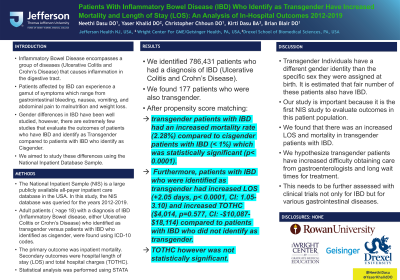Back


Poster Session C - Monday Afternoon
Category: IBD
C0358 - Patients With Inflammatory Bowel Disease (IBD) Who Identify as Transgender Have Increased Mortality and Length of Stay (LOS): An Analysis of In-Hospital Outcomes 2012-2019
Monday, October 24, 2022
3:00 PM – 5:00 PM ET
Location: Crown Ballroom

Has Audio

Neethi Dasu, DO
Jefferson Health New Jersey
Voorhees, NJ
Presenting Author(s)
Neethi Dasu, DO1, Yaser Khalid, DO2, Christopher Chhoun, DO3, Kirti Dasu, BA4, Brian Blair, DO5
1Jefferson Health New Jersey, Voorhees, NJ; 2Wright Center for GME/Geisinger Health System, Scranton, PA; 3Jefferson Health NJ, Voorhees, NJ; 4Drexel Graduate School of Biomedical Sciences and Professional Studies, Philadelphia, PA; 5Jefferson Health New Jersey, Cherry HIll, NJ
Introduction: Inflammatory Bowel Disease encompasses a group of diseases (Ulcerative Colitis and Crohn’s Disease) that causes inflammation in the digestive tract. Patients affected by IBD can experience a gamut of symptoms which range from gastrointestinal bleeding, nausea, vomiting, and abdominal pain to malnutrition and weight loss. Gender differences in IBD have been well studied, however, there are extremely few studies that evaluate the outcomes of patients who have IBD and identify as Transgender compared to patients with IBD who identify as Cisgender. We aimed to study these differences using the National Inpatient Database Sample.
Methods: The National Inpatient Sample (NIS) is a large publicly available all-payer inpatient care database in the USA. In this study, the NIS database was queried for the years 2012-2019. Adult patients ( >age 18) with a diagnosis of IBD (Inflammatory Bowel disease, either Ulcerative Colitis or Crohn’s Disease) who identified as transgender versus patients with IBD who identified as cisgender, were found using ICD-10 codes. The primary outcome was inpatient mortality. Secondary outcomes were hospital length of stay (LOS) and total hospital charges (TOTHC). Statistical analysis was performed using STATA
Results: We identified 786,431 patients who had a diagnosis of IBD (Ulcerative Colitis and Crohn’s Disease). We found 177 patients who were also transgender. After propensity score matching, transgender patients with IBD had an increased mortality rate (2.28%) compared to cisgender patients with IBD (< 1%) which was statistically significant (p< 0.0001). Furthermore, patients with IBD who were identified as transgender had increased LOS (+2.05 days, p< 0.0001, CI: 1.05-3.10) and increased TOTHC ($4,014, p=0.577, CI: -$10,087-$18,114) compared to patients with IBD who did not identify as transgender. TOTHC however was not statistically significant.
Discussion: Transgender Individuals have a different gender identity than the specific sex they were assigned at birth. It is estimated that fair number of these patients also have IBD. Our study is important because it is the first NIS study to evaluate outcomes in this patient population. We found that there was an increased LOS and mortality in transgender patients with IBD. We hypothesize transgender patients have increased difficulty obtaining care from gastroenterologists and long wait times for treatment. This needs to be further assessed with clinical trials not only for IBD but for various gastrointestinal diseases.
Disclosures:
Neethi Dasu, DO1, Yaser Khalid, DO2, Christopher Chhoun, DO3, Kirti Dasu, BA4, Brian Blair, DO5. C0358 - Patients With Inflammatory Bowel Disease (IBD) Who Identify as Transgender Have Increased Mortality and Length of Stay (LOS): An Analysis of In-Hospital Outcomes 2012-2019, ACG 2022 Annual Scientific Meeting Abstracts. Charlotte, NC: American College of Gastroenterology.
1Jefferson Health New Jersey, Voorhees, NJ; 2Wright Center for GME/Geisinger Health System, Scranton, PA; 3Jefferson Health NJ, Voorhees, NJ; 4Drexel Graduate School of Biomedical Sciences and Professional Studies, Philadelphia, PA; 5Jefferson Health New Jersey, Cherry HIll, NJ
Introduction: Inflammatory Bowel Disease encompasses a group of diseases (Ulcerative Colitis and Crohn’s Disease) that causes inflammation in the digestive tract. Patients affected by IBD can experience a gamut of symptoms which range from gastrointestinal bleeding, nausea, vomiting, and abdominal pain to malnutrition and weight loss. Gender differences in IBD have been well studied, however, there are extremely few studies that evaluate the outcomes of patients who have IBD and identify as Transgender compared to patients with IBD who identify as Cisgender. We aimed to study these differences using the National Inpatient Database Sample.
Methods: The National Inpatient Sample (NIS) is a large publicly available all-payer inpatient care database in the USA. In this study, the NIS database was queried for the years 2012-2019. Adult patients ( >age 18) with a diagnosis of IBD (Inflammatory Bowel disease, either Ulcerative Colitis or Crohn’s Disease) who identified as transgender versus patients with IBD who identified as cisgender, were found using ICD-10 codes. The primary outcome was inpatient mortality. Secondary outcomes were hospital length of stay (LOS) and total hospital charges (TOTHC). Statistical analysis was performed using STATA
Results: We identified 786,431 patients who had a diagnosis of IBD (Ulcerative Colitis and Crohn’s Disease). We found 177 patients who were also transgender. After propensity score matching, transgender patients with IBD had an increased mortality rate (2.28%) compared to cisgender patients with IBD (< 1%) which was statistically significant (p< 0.0001). Furthermore, patients with IBD who were identified as transgender had increased LOS (+2.05 days, p< 0.0001, CI: 1.05-3.10) and increased TOTHC ($4,014, p=0.577, CI: -$10,087-$18,114) compared to patients with IBD who did not identify as transgender. TOTHC however was not statistically significant.
Discussion: Transgender Individuals have a different gender identity than the specific sex they were assigned at birth. It is estimated that fair number of these patients also have IBD. Our study is important because it is the first NIS study to evaluate outcomes in this patient population. We found that there was an increased LOS and mortality in transgender patients with IBD. We hypothesize transgender patients have increased difficulty obtaining care from gastroenterologists and long wait times for treatment. This needs to be further assessed with clinical trials not only for IBD but for various gastrointestinal diseases.
Disclosures:
Neethi Dasu indicated no relevant financial relationships.
Yaser Khalid indicated no relevant financial relationships.
Christopher Chhoun indicated no relevant financial relationships.
Kirti Dasu indicated no relevant financial relationships.
Brian Blair indicated no relevant financial relationships.
Neethi Dasu, DO1, Yaser Khalid, DO2, Christopher Chhoun, DO3, Kirti Dasu, BA4, Brian Blair, DO5. C0358 - Patients With Inflammatory Bowel Disease (IBD) Who Identify as Transgender Have Increased Mortality and Length of Stay (LOS): An Analysis of In-Hospital Outcomes 2012-2019, ACG 2022 Annual Scientific Meeting Abstracts. Charlotte, NC: American College of Gastroenterology.
